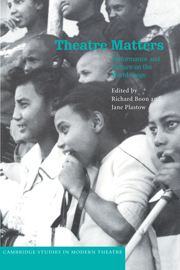Book contents
- Frontmatter
- Contents
- Notes on contributors
- Foreword: A letter from Kingston
- Preface
- Acknowledgements
- 1 Introduction
- 2 ‘The Revolution as Muse’: drama as surreptitious insurrection in a post-colonial, military state
- 3 Making theatre for a change: two plays of the Eritrean liberation struggle
- 4 Race matters in South African theatre
- 5 Dreams of violence: moving beyond colonialism in Canadian and Caribbean drama
- 6 The French-speaking Caribbean: journeying from the native land
- 7 ‘Binglishing’ the stage: a generation of Asian theatre in England
- 8 Popular theatre for the building of social awareness: the Indian experience
- 9 The promise of performance: True Love/Real Love
- 10 Making America or making revolution: the theatre of Ricardo Halac in Argentina
- Index
6 - The French-speaking Caribbean: journeying from the native land
Published online by Cambridge University Press: 25 October 2009
- Frontmatter
- Contents
- Notes on contributors
- Foreword: A letter from Kingston
- Preface
- Acknowledgements
- 1 Introduction
- 2 ‘The Revolution as Muse’: drama as surreptitious insurrection in a post-colonial, military state
- 3 Making theatre for a change: two plays of the Eritrean liberation struggle
- 4 Race matters in South African theatre
- 5 Dreams of violence: moving beyond colonialism in Canadian and Caribbean drama
- 6 The French-speaking Caribbean: journeying from the native land
- 7 ‘Binglishing’ the stage: a generation of Asian theatre in England
- 8 Popular theatre for the building of social awareness: the Indian experience
- 9 The promise of performance: True Love/Real Love
- 10 Making America or making revolution: the theatre of Ricardo Halac in Argentina
- Index
Summary
In 1992 the Nobel Prize for Literature was awarded to a Caribbean poet and dramatist for the first time, in the person of Derek Walcott. The theatre of the French-speaking Caribbean, comprising French Guyana, Guadeloupe and Martinique, has yet to receive such an accolade. International acclaim tends to favour novelists such as Patrick Chamoiseau, Edouard Glissant, Simone Schwarz-Bart and Maryse Condé. This is not to say that a distinctive francophone theatre culture does not properly exist in the Caribbean. In fact, Glissant, Schwarz-Bart and Condé have all successfully written plays as well (Monsieur Toussaint, Ton beau capitaine [Your Handsome Captain] and Pension les Alizés [The Tropical Breeze Hotel] respectively). The theatre is by its very nature ephemeral and the French publishing realm is clearly more interested in the worldwide dissemination of prose than of dramatic texts. And yet the theatre is a vital marker of cultural identity, the nature of which has been a key subject of debate in the French-speaking Caribbean for at least the past sixty years, a debate which continues to shape political ideologies.
No two figures have made more of an impact in the creation of post-colonial culture in relation to political theory than Aimé Césaire and Frantz Fanon; both denizens of the young African states, both citizens of France, both natives of Martinique. A third figure, also from Martinique, has emerged since the 1970s to carry the debate of cultural politics/political culture(s) forward, beyond the so-called decade of independence and into the age of Maastricht. That figure is Daniel Boukman.
- Type
- Chapter
- Information
- Theatre MattersPerformance and Culture on the World Stage, pp. 97 - 125Publisher: Cambridge University PressPrint publication year: 1998
- 1
- Cited by



